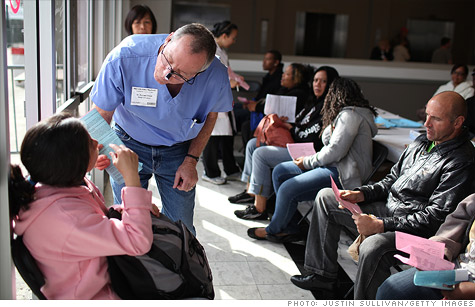Search News

Even if the Supreme Court strikes down the health care law, industry experts expect some states will still proceed with establishing health insurance exchanges.
NEW YORK (CNNMoney) -- The Supreme Court's review of health reform means any or all of the law's mandates, such as coverage of adult dependents up to age 26 and protections for people with pre-existing conditions, could be in jeopardy.
But health insurance exchanges -- which also must be set up as part of the law -- may survive and flourish even if the entire Affordable Care Act is struck down, industry experts said.
Exchanges are meant to offer cheaper health plans, so more of the nation's 32 million uninsured can afford coverage.
Regardless of what happens to the health reform law, "there is bipartisan support for states having some kind of health insurance exchanges," said Christopher Condeluci, a tax attorney with law firm Venable LLP and former tax counsel to the Senate Finance Committee.
Among other things, health reform mandates that by 2014 all states set up a health insurance "exchange," an online marketplace where consumers who are underinsured or uninsured will be able to shop for subsidized coverage, and small businesses can buy more affordable plans for their workers.
The law also gives states federal grants to help build their exchanges.
The Court, which is expected to announce its ruling on the constitutionality of the Act later this month, could uphold the law, overturn it partially, or completely strike it down.
If the law is struck down completely, the loss of federal grants will make it harder for states to start exchanges, said Brett Graham, head of the Insurance Exchange Practice at health care consulting firm Leavitt Partners in Salt Lake City, Utah. (See correction, below).
But the "train has already left the station" and some states will establish exchanges anyway, Graham said.
Indeed, even before health reform passed in 2010, Massachusetts and Utah already operated insurance exchanges. And a handful of states were exploring setting them up as a way to cut their health care spending by getting more residents insured, said Dan Schuyler, former director of technology who helped launch Utah's exchange in 2009.
With fewer uninsured people, there's less financial burden on states' public health-care programs such as Medicaid.
Soon after health reform became law, two dozen states reached out to learn more about Utah's program, said Schuyler, now a director with Leavitt Partners.
Two years later, many of those same states remain committed to establishing exchanges. California, Oregon, Maryland, Colorado and New York have already passed legislation to establish state-based exchanges by 2014, said Brett Graham, head of Leavitt Partners' Insurance Exchange Practice.
That's in contrast to some other states that have asked for waivers on meeting the deadline for setting up exchanges, are taking a wait-and-see approach, or are actively fighting health reform.
In any case, consumer demand for the exchanges is already there, said Condeluci. "Whether it's individuals buying their own coverage or employers buying it for them, people want a consumer-friendly place to buy health insurance," he said.
Still, if the law is struck down, creating exchanges will get trickier, said Jeff Munn, vice president of benefit policy development with Fidelity Investments.
"Without the mandate of a uniform structure, states themselves have to figure out what the exchanges look like," said Munn. "It will be a little bit of a Wild Wild West."
Another big question is how the exchanges will be financed if the federal government doesn't pony up money for them, said Munn.
Also unclear is whether states that already got federal grants to set up exchanges would have to give it back, said Munn.
But despite these questions, Munn believes more exchanges will begin to roll out.
"In many states the scaffolding is already there for health exchanges," he said. "The hope is that if they build it, people will come."
--Correction: An earlier version of this story incorrectly identified Leavitt Partners. It is a health care consulting firm. ![]()
| Overnight Avg Rate | Latest | Change | Last Week |
|---|---|---|---|
| 30 yr fixed | 3.80% | 3.88% | |
| 15 yr fixed | 3.20% | 3.23% | |
| 5/1 ARM | 3.84% | 3.88% | |
| 30 yr refi | 3.82% | 3.93% | |
| 15 yr refi | 3.20% | 3.23% |
Today's featured rates:
| Latest Report | Next Update |
|---|---|
| Home prices | Aug 28 |
| Consumer confidence | Aug 28 |
| GDP | Aug 29 |
| Manufacturing (ISM) | Sept 4 |
| Jobs | Sept 7 |
| Inflation (CPI) | Sept 14 |
| Retail sales | Sept 14 |